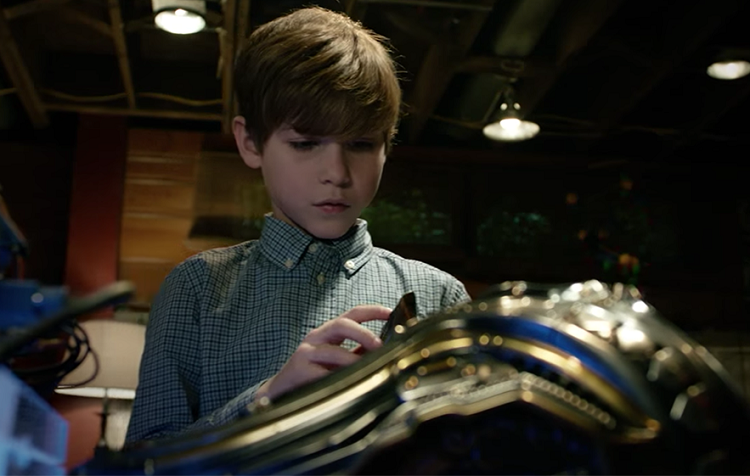
Shane Black's The Predator finally opened this past weekend to middling box office and unenthusiastic reviews. Black, arguably the greatest screenwriter of his generation, exploded on the scene with his screenplay for Lethal Weapon, made one of the best directorial debuts of his generation with Kiss Kiss Bang Bang, and then turned Iron Man Three into a standalone deconstruction of superhero fiction that I still consider the best of the Marvel Cinematic Universe. Walking out of The Predator on Thursday night, I didn't quite want to cry, but stress eating might have been a good idea.
The film is a travesty, an incoherent mess devoid of Black's signature vulgarity and self-aware eloquence. To see Black, a personal hero and a genre voice as distinct as Scorsese or Tarantino, diluted to this was heartbreaking. The film has plenty of problems, but, ultimately, one mistake in The Predator overshadows everything else that has drawn widespread ire. Surprisingly, this has been overlooked in discussing the film's baggage. That Achilles' heel is Rory McKenna, the 11-year-old autistic Predator-whisperer played by Jacob Tremblay.
In 1992, at the age of five, I was diagnosed with Asperger's syndrome. I have spent my entire life on the autistic spectrum. In recent years, I've seen TV and movies revert my disability to a minstrel act that assumes Asperger's is the hallmark of monochromatic emotions, fatal social anxiety, and a prodigious understanding of logistical fields such as mathematics and science. Rory is the most offensive, stigmatizing portrayal of Asperger's I've yet seen committed to film.
From his introduction in science class, perfecting his lab work and carefully laying out a chess set, I felt the film sinking immediately. Seconds later, two bullies enter the room yelling "ASS BURGER!" at Rory, bullying him into submission and knocking over his chess board. Rory doesn't emote much after the terror. He's scared in the moment, but afterward, he rearranges the chess set per his photographic memory. When he gets home, he reprograms the Predator mask his father stole so he can wear it trick-or-treating on Halloween. As state-of-the-art Predator masks tends to do, it gets on the defensive when the bullies ambush Rory and ends up killing one of their accomplices by blowing up his house.
Black and Fred Dekker's screenplay is explicit in diagnosing Rory with Asperger's. He only speaks, if barely, to his parents. He has no friends. He's not social. However, while the lack of social skills and his laser-focused intelligence are not objective stereotyping, the methodology of Tremblay's performance implies that he has a more severe autistic disorder. If Rory was Asperger's, he would be able to have a conversation, if with a narrow field of interests. He would be more articulate, perhaps too blunt, about his thoughts and feelings on a variety of things.
Trust me, I know this from personal experience.
My diagnosis was removed from the Diagnostic and Statistical Manual of Mental Disorders in 2013. Asperger's now falls under "Social Communications Disorder" as a "mild" form of autism — a word I have always used to describe my experience and evolution of self-character. When I was Tremblay's age, my mom didn't give me an ultimatum on whether to be a pirate or Frankenstein's monster for Halloween. Movies are my primary interest. How else do I explain my micromanaged Han Solo get-up on Halloween 1997? Or the years where The Shadow and Mystery Men's Mr. Furious were costumes I insisted on pulling off?
Rory is unique without reason or compulsion. This aptitude becomes important when Munn's government scientist, Casey Bracket, insists that Rory represents the possibility that his (my) kind is a step forward in the evolution of mankind. Indeed, this is a phenomenon that has been discussed in various forums and publications: humans are not immune to evolution, and the frequency of autism diagnoses in children has increased from 1 in 150 in 1992, when I was diagnosed, to 1 in 59 in 2018. However, these statistics only lead to Rory becoming the 11-foot tall eponymous Predator's ultimate target. The alien has evolved, therefore the quarry has evolved. Rory escapes the bullies, only to come face to face with graver danger. No progress, return to jail on the Monopoly board as an object of distress.
The Predator gives Rory little to no chance to flourish as a character or overcome his weaknesses. There are so many plot threads running through the film that trying to give Rory the arc of an underdog who triumphs over the neurotypicals (our word for those with no experience with the spectrum) would go under-cooked. There was an opening to forge a dynamic contrast between Rory and the Loonies, the psychologically fractured mercenaries that battle the Predators in the film, but the elbow-grease storytelling never bothers going there. Later, during the incomprehensible third act, Sterling K. Brown's agitated government shadow man holds a gun to Rory's head. Further trauma comes about when the Ultimate Predator stalks him in the retooled forest finale, yet Rory never sheds a tear or has a negative sensory reaction as he did when he was first introduced. How? Why? In this permutation of the film, it does not matter.
According to a recent article at Screen Rant on changes that were made to the film during production, Rory was originally supposed to summon the Thanos of Predators with his innate knack for linguistics. In the final film, however, contact is made through his stereotyped coding skills. Furthermore, the original vision was for Rory to use his expertise to not only take control of the Predator spaceship, but also to kill the behemoth. Had Rory's book-smart, obsessive connection to foreign languages not been excised, I would not have had such a visceral reaction to The Predator. It would have given the character more than one dimension, and his place in the final confrontation would have merit. Instead, the film we're stuck with— assuming the original cut is under lock and key, as is the case with recent big-budget recalibrations like Justice League and Rogue One: A Star Wars Story — makes Rory's journey an R-rated Halloween episode of Young Sheldon.
I do not believe that Black and Dekker conceived Rory in bad faith, but I do believe he was given Asperger's as a buzz word, not a diagnosis. This is all the more disheartening considering that Lethal Weapon remains one of my favorite films. As played by Mel Gibson in the original 1987 film, Martin Riggs is one of the most realistic portrayals of mental illness I've ever seen. Riggs's suicidal tendencies, depressive outbursts, and obsessive job rhetoric, where he trudges on with the dangers of being a narcotics detective in the hopes of getting himself killed, have only resonated deeper with age. Riggs is rejected by his colleagues as a homicidal class clown whose methods are seen as a show. When Roger Murtaugh is assigned as his new partner, small talk turns acrimonious quickly, leading to an unsubtle bit of self-deprecation that I've often thought of at work and in social settings.
"Hey, look friend, let's just cut the shit," Riggs snaps. "Now, we both know why I was transferred. Everybody thinks I'm suicidal, in which case I'm fucked and nobody wants to work with me. Or, they think I'm faking to draw a psycho pension, in which case I'm fucked and nobody wants to work with me. Basically, I'm fucked."
Murtaugh responds, "I don't want to work with you!" Their tension boils over when Riggs proves his death wish to Murtaugh after his unconventional and dangerous method of talking down a suicide jumper. Only when Riggs politely acknowledges Murtaugh's recent birthday does their relationship prosper. It's a small, almost insignificant resolution, but it indicates Riggs's cloudy perception of the world.
While Lethal Weapon always connected Riggs's psychological wounds to post-traumatic stress disorder, specifically his tour in Vietnam and his wife's death, the way Riggs perseverates about his workload — especially in the first two films (the ones Black has a writing credit on) — connects with my own mental health struggles, as well as the degree of perfectionism with which I struggle to make my life bulletproof from hardship.
As an "Aspie," I would diagnose Riggs with Asperger's. I would pinpoint Robert Downey Jr.'s two roles for Black — Harry Lockhart, the socially awkward petty thief in Kiss Kiss Bang Bang, and especially doubling down on Tony Stark as a quirky, existentially tortured smartass in Iron Man Three — as viably subjective takes on my disability. I cannot say that Black's endgame in getting The Predator to fruition was to have Rory suffering from a mass-consumption idea of Asperger's. As a writer, Black has always been as psychological as he is witty. If it was the plan, shame on me, but it reeks of a studio note.
Ultimately, The Predator repeats the same ugly message about the autistic spectrum that caricatures like The Big Bang Theory's Sheldon Cooper and The Good Doctor's Dr. Shaun Murphy breathe down our necks. These shows and The Predator infer that anyone with any form of autism breaks down to a chilling adage: he or she is special, and because of their uniqueness, their diagnosis is considered a kind of superpower.
Unlike Rory, advanced-level science and mathematics give me panic-inducing confusion as I scramble to figure it out. I can name every Academy Award winner for Best Visual Effects in chronological order over 40 years, but I would last ten minutes in attempting to get a degree in aerospace engineering. I'm a creative thinker. If I found a Predator mask, I'd hang it on my wall as a work of art. I wouldn't have a clue how to weaponize alien metal on my MacBook Pro if the instruction manual was in clear sight on Reddit.
I'll be 31 next week. I still have soul-crushing moments of depression and anxiety that make me feel 10 years old again. I cry trying to shop at IKEA. I have a fear of police cars to a point that being pulled over is equivalent to a death sentence. In despair, I feel the need to tell a dozen people on top of my therapist about the latest sources of emotional pain. I am not a superhero. I am only human. I am flawed. I make mistakes. If I don't self-disclose my disability, there is a chance you may never know who I really am.
2018 has been a landmark year for representation of diversity in film. Trying to give Asperger's or the autistic spectrum their Black Panther or Crazy Rich Asians moment is untenable because it's not a subject of heritage or culture, but it shouldn't be this difficult to create a character with Asperger's who is as complex as our minds. Asperger's is not singular. Some difficulties are common threads in different individuals, but no two are exactly alike. Rory McKenna, however, was produced on the same assembly line that dropped Sheldon and Dr. Murphy into our lexicon. We have a long way to go. To paraphrase the film's ad campaign, the interpretation has not evolved.











